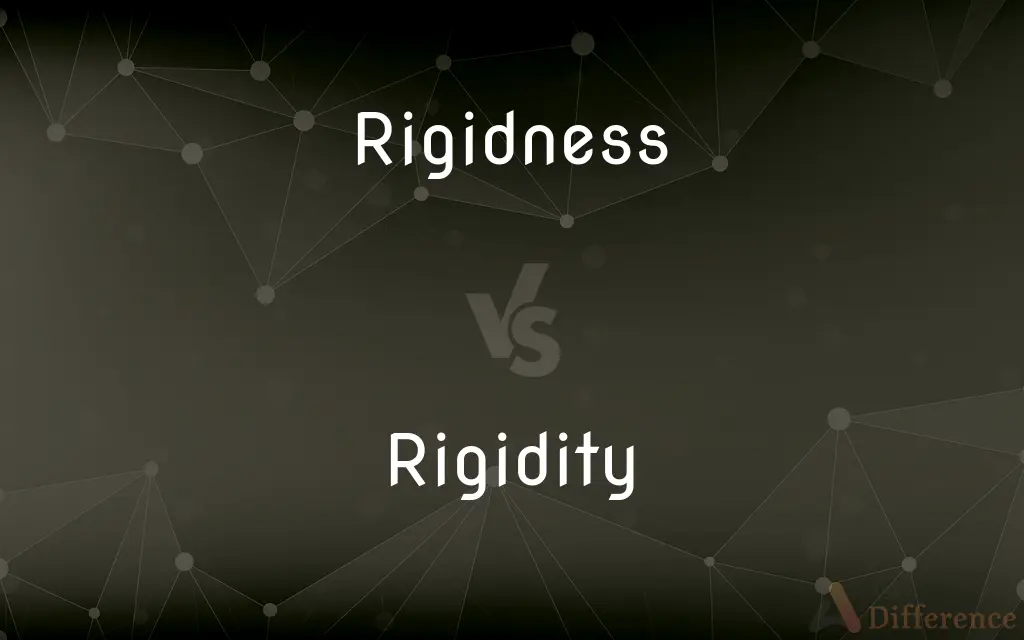Rigidness vs. Rigidity — What's the Difference?
By Urooj Arif & Maham Liaqat — Updated on April 24, 2024
"Rigidness" and "rigidity" both describe the quality of being inflexible, while "rigidity" is the more commonly used and preferred term in formal contexts.

Difference Between Rigidness and Rigidity
Table of Contents
ADVERTISEMENT
Key Differences
"Rigidness" is a noun that denotes the quality of being unable to bend or be forced out of shape, suggesting physical or metaphorical inflexibility. In contrast, "rigidity" refers to the same concept but is more frequently used in both scientific and everyday language, often implying a higher degree of stiffness or inflexibility.
In terms of usage, "rigidness" appears less frequently in literature and daily speech, making it seem somewhat outdated or less preferred. On the other hand, "rigidity" is widely recognized and used across various fields, including physics, engineering, and psychology, due to its precision and familiarity.
When describing materials or mechanical properties, "rigidness" can sometimes be found in informal discussions or less technical descriptions. Whereas "rigidity" is the term of choice in technical specifications, scientific research, and formal assessments due to its established presence in technical lexicons.
In metaphorical contexts, such as describing an organization’s strict procedures or a person's uncompromising attitude, "rigidity" is also more common. It conveys a stronger sense of strictness and unyielding adherence to rules or standards, while "rigidness" might be used more colloquially.
The preference for "rigidity" extends into educational and professional settings, where it is often taught and used as the standard term. "Rigidness," while understandable, may be perceived as less sophisticated or less appropriate in academic and professional writings.
ADVERTISEMENT
Comparison Chart
Common Usage
Less common, informal
More common, formal
Preferred Contexts
Colloquial, non-technical
Scientific, technical, formal
Implication
General inflexibility
High degree of stiffness
Fields of Application
Less specified
Physics, engineering, psychology
Metaphorical Use
Less frequent
Frequently used in metaphorical contexts
Compare with Definitions
Rigidness
Lack of flexibility or adaptability in approach or attitude.
His rigidness in negotiations often led to stalemates.
Rigidity
The inability to be bent or forced out of shape.
The rigidity of the steel beams contributes to the building's stability.
Rigidness
The quality of being stiff and not easily bent.
The rigidness of the old book’s cover made it hard to open.
Rigidity
The quality of being very strict and difficult to change.
The rigidity of the rules discourages creativity in the team.
Rigidness
The state of being strict or severe.
The manager’s rigidness left no room for casual dress at the workplace.
Rigidity
Firmness or stiffness of character or manner.
His rigidity in leadership often led to conflicts within the group.
Rigidness
The characteristic of being unyielding or immovable.
The rigidness of her beliefs made it difficult to argue with her.
Rigidity
The state of being inflexible or unadaptable.
The company’s rigidity in sticking to old methods may hinder its growth.
Rigidness
The property of resisting deformation.
The bridge’s design emphasized rigidness to withstand heavy traffic.
Rigidity
The characteristic of a body resisting deformation.
Engineers measure the rigidity of materials to predict their performance under stress.
Rigidness
Not flexible or pliant; stiff
A rigid material.
Rigidity
Inability to be to bent or be forced out of shape
The tough substance that gives plants their rigidity
Rigidness
Not moving or flexing
Rigid muscles.
Rigidity
Inability to be changed or adapted
The rigidity of the school system
Rigidness
Not changing or adjusting to different conditions or problems
A rigid thinker.
A rigid hierarchy.
Rigidity
The quality or state of being rigid.
Rigidness
Scrupulously or severely maintained or performed; rigorous or harsh
Rigid discipline.
Rigidity
An instance of being rigid.
Rigidness
Being an airship with a external frame made of rigid parts.
Rigidity
The quality or state of being rigid; lack of pliability; the quality of resisting change of physical shape
Rigidness
Rigidity.
Rigidity
The amount of resistance with which a body opposes change of form.
Rigidness
The quality or state of being rigid.
Rigidity
Stiffness of appearance or manner; want of ease or elegance.
Rigidness
The physical property of being stiff and resisting bending
Rigidity
(economics) stickiness (of prices/wages etc.). Describing the tendency of prices and money wages to adjust to changes in the economy with a certain delay.
Rigidity
The quality or state of being rigid; want of pliability; the quality of resisting change of form; the amount of resistance with which a body opposes change of form; - opposed to flexibility, ductility, malleability, and softness.
Rigidity
Stiffness of appearance or manner; want of ease or elegance.
Rigidity
Severity; rigor.
Rigidity
The physical property of being stiff and resisting bending
Rigidity
The quality of being rigid and rigorously severe
Common Curiosities
What is rigidity?
Rigidity is the state of being unable to bend or be easily modified.
How does one measure rigidity in materials?
Rigidity in materials is measured by assessing their modulus of elasticity or stiffness.
What is rigidness?
Rigidness refers to the quality of being stiff or inflexible.
Are rigidness and rigidity interchangeable in scientific contexts?
In scientific contexts, "rigidity" is preferred for its precision and commonality.
What impacts the rigidity of a structure?
Material choice, geometric design, and construction quality all impact the rigidity of a structure.
Why is rigidity important in construction?
Rigidity is crucial for ensuring that buildings and other structures can withstand external forces and stresses.
How do engineers enhance the rigidity of a material?
Engineers can enhance rigidity by altering material compositions or using different manufacturing techniques.
Can rigidness and rigidity be used in psychological terms?
Yes, though "rigidity" is more common, especially when discussing personality traits or behaviors.
Can a person's thinking be described as having rigidity?
Yes, if their thinking is inflexible and strictly adheres to certain rules or beliefs.
What are the consequences of excessive rigidity in management?
Excessive rigidity in management can stifle innovation and employee motivation.
How does temperature affect rigidity?
Temperature can affect the rigidity of materials, as many become more flexible or less rigid when heated.
Is rigidity a desirable property in vehicles?
Yes, rigidity in vehicle frames improves safety and handling characteristics.
What is the opposite of rigidity?
Flexibility or adaptability is the opposite of rigidity.
Can rigidity be beneficial in any context?
Yes, in contexts where strict adherence to rules or standards is necessary for safety or quality.
How does cultural rigidity affect society?
Cultural rigidity can hinder social progress and adaptation to new circumstances or ideas.
Share Your Discovery

Previous Comparison
Beau vs. Boo
Next Comparison
Dress vs. CostumeAuthor Spotlight
Written by
Urooj ArifUrooj is a skilled content writer at Ask Difference, known for her exceptional ability to simplify complex topics into engaging and informative content. With a passion for research and a flair for clear, concise writing, she consistently delivers articles that resonate with our diverse audience.
Co-written by
Maham Liaqat













































